Doctors set to give update on Trump's health Sunday morning
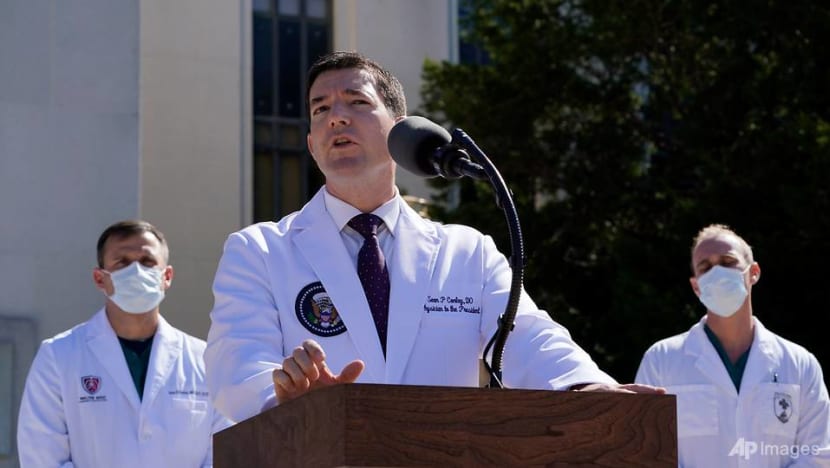
Dr. Sean Conley, physician to President Donald Trump, briefs reporters at Walter Reed National Military Medical Center in Bethesda, Md., Saturday, Oct. 3, 2020. Trump was admitted to the hospital after contracting the coronavirus. (AP Photo/Susan Walsh)
BETHESDA, Maryland: President Donald Trump's hospitalisation stretched into a third day on Sunday (Oct 4) as he and his health team sought to clarify contradictory statements and confusion from the day before that raised questions about the seriousness of his fight with COVID-19.
Doctors were set to provide a briefing on Trump's health late Sunday morning.
The president faces “critical” coming days after a “very concerning” period in his fight against COVID-19 at a military hospital, his chief of staff said Saturday — in contrast to a rosier assessment from Trump's doctors.
Trump offered his own assessment of his status Saturday evening in a video from his hospital suite, saying he was beginning to feel better and hoped to “be back soon”. And he was back on social media early Sunday morning, sharing a video of flag-waving supporters, most not wearing masks, gathered outside Walter Reed National Military Medical Center.
“Thank you so much!” Trump tweeted at 7.18am.
READ: Trump 'much better' but White House doctor says 'not yet out of the woods'
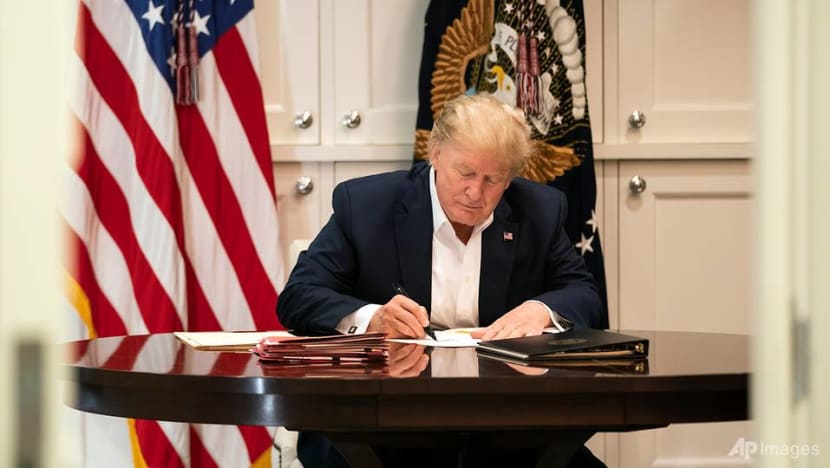
The changing, and at times contradictory, accounts created a credibility crisis for the White House at a crucial moment, with the president’s health and the nation’s leadership on the line. Moreover, the president's health represents a national security issue of paramount importance not only to the functions of the US government but also to countries around the world, friendly and otherwise.
Trump's Democratic challenger, Joe Biden, pulled his attack ads off the air during Trump's hospitalisation, and on Sunday, he dispatched senior aides to deliver a largely friendly message.
READ: What happens if a US presidential candidate exits the race?
“We are sincerely hoping that the president makes a very quick recovery, and we can see him back out on the campaign trail very soon," Biden adviser Symone Sanders said on CNN's State of the Union.
She added: “This is a glaring reminder that the virus is real.”
Biden was at home in Wilmington, Delaware, on Sunday with no plans for in-person campaigning or other public appearances.
Having already tested negative, he is expected to release the results of a new coronavirus test later in the day, and the campaign has pledged to disclose those results and all other future test results for the 77-year-old candidate.
On Saturday, chief of staff Mark Meadows told reporters outside the hospital, “We’re still not on a clear path yet to a full recovery.” In an update Saturday night, Trump’s chief doctor expressed cautious optimism but added that the president was “not yet out of the woods”.
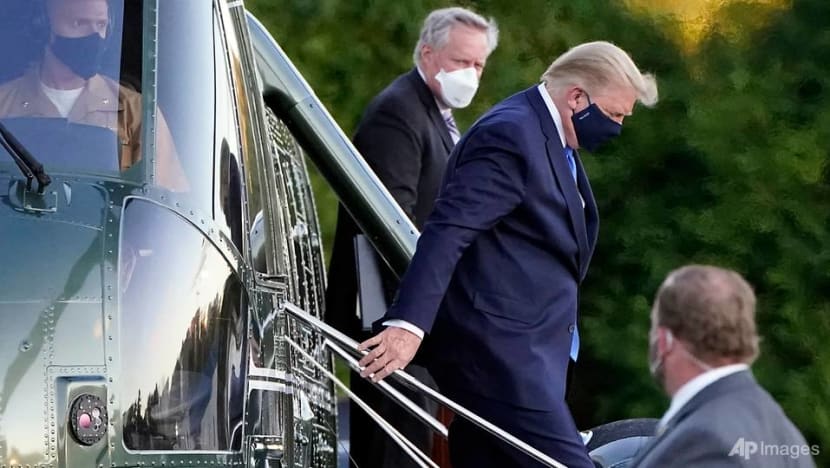
Saturday's briefing by Navy Commander Dr Sean Conley and other doctors raised more questions than it answered.
Conley repeatedly refused to say whether the president ever needed supplemental oxygen and declined to share key details, including how high a fever Trump had been running before it came back down to a normal range.
Conley also revealed that Trump had begun exhibiting “clinical indications” of COVID-19 on Thursday afternoon, earlier than previously known.
READ: Trump improving but doctors were 'very concerned': White House chief of staff
According to a person familiar with Trump’s condition, Trump was administered oxygen at the White House on Friday morning, before he was transported to the military hospital by helicopter that evening. The person was not authorised to speak publicly and spoke to The Associated Press on condition of anonymity.
Conley said that Trump's symptoms, including a mild cough, nasal congestion and fatigue, “are now resolving and improving”, and that the president had been fever-free for 24 hours. But Trump also is taking aspirin, which lowers body temperature and could mask or mitigate that symptom.
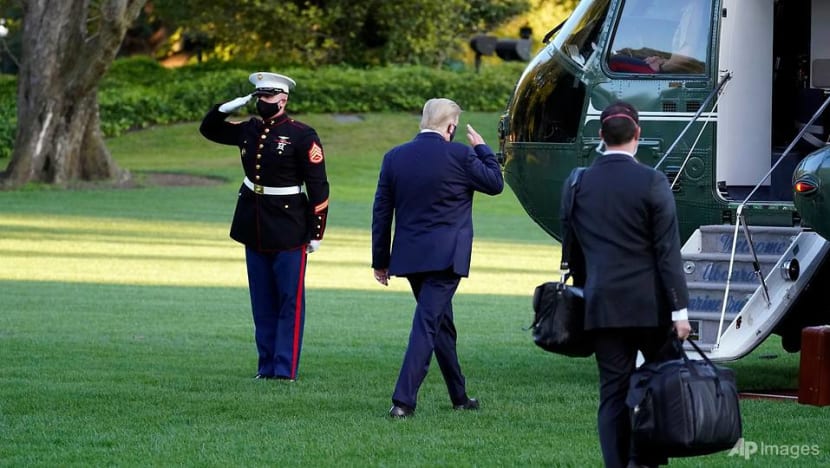
In an evening health update, Conley said Trump had been up and moving around his medical suite without difficulty and conducting business. “While not yet out of the woods, the team remains cautiously optimistic,” he said.
Meanwhile, Trump’s handling of the pandemic and his own health faced new scrutiny.
Trump’s medical care is far superior to the average American’s, with around-the-clock attention and experimental treatments. In the hospital video, he defended his decision to continue campaigning and holding large events during a pandemic.
“I had no choice,” said Trump, who refused to abide by basic public health recommendations, including mask-wearing. "I had to be out front. ... I can’t be locked up in a room upstairs and totally safe. ... As a leader, you have to confront problems.”
Trump is 74 years old and clinically obese, putting him at higher risk of serious complications from a virus that has infected more than 7 million people nationwide and killed more than 209,000 people in the US.
First lady Melania Trump remained at the White House to recover from her own bout with the virus.
Trump's administration has been less than transparent with the public throughout the pandemic, both about the president’s health and the virus's spread inside the White House.
The first word that a close aide to Trump had been infected came from the media, not the White House. And aides have repeatedly declined to share basic health information, including a full accounting of the president’s symptoms, what tests he’s undertaken and the results.
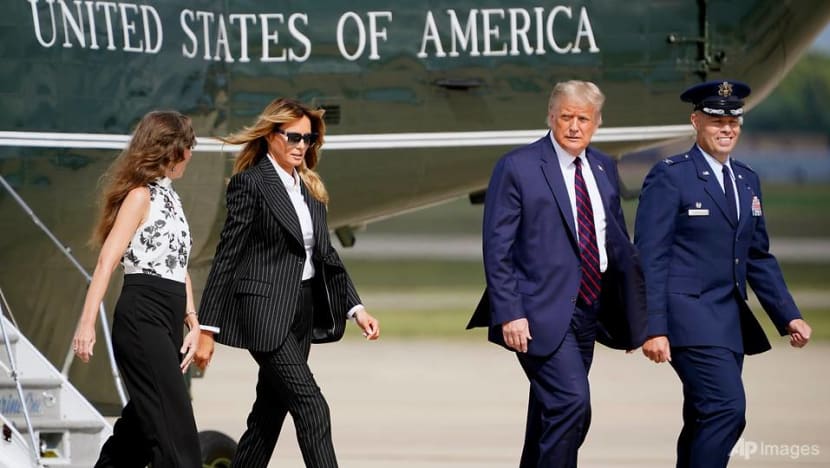
Conley declined to say when Trump had last been tested before he was confirmed to have COVID-19 late Thursday.
He initially suggested that Trump was 72 hours into the diagnosis — which would mean that he was confirmed infected Wednesday.
Conley later clarified that Trump was administered an accurate test for the virus on Thursday afternoon.
The White House has said Trump was expected to stay at the hospital for “a few days” and would continue to work from its presidential suite, which is equipped to allow him to keep up his official duties.
On Saturday, Conley said Trump’s blood oxygen level was 96 per cent, which is in the normal range. The two experimental drugs he has received, given through an IV, have shown some promise against COVID-19.
READ: Trump White House, campaign staff who have tested positive for COVID-19
He noted that in many cases, COVID-19 can become more dangerous as the body responds. “The first week of COVID, and in particular day seven to 10, are the most critical in determining the likely course of this illness,” he said.
At the same time, the White House has been working to trace a flurry of new infections of close Trump aides and allies. Attention is focused in particular on the Sep 26 White House event introducing Trump’s Supreme Court nominee.
That day, Trump gathered more than 150 people in the Rose Garden, where they mingled, hugged and shook hands — overwhelmingly without masks.
There were also several indoor receptions, where Trump’s Supreme Court pick, Amy Coney Barrett, her family, senators and others spent time in the close quarters of the White House, photographs show.
Among those who attended and have now tested positive: former New Jersey Governor Chris Christie, former White House counselor Kellyanne Conway, the president of the University of Notre Dame and at least two Republican lawmakers — Utah Senator Mike Lee and North Carolina Senator Thom Tillis.
The president’s campaign manager, Bill Stepien, and the head of the Republican National Committee, Ronna McDaniel, have also tested positive, though they were not at the event. Another prominent Republican who has tested positive: Senator Ron Johnson. R-Wis.
BOOKMARK THIS: Our comprehensive coverage of the coronavirus outbreak and its developments
Download our app or subscribe to our Telegram channel for the latest updates on the coronavirus outbreak: https://cna.asia/telegram










